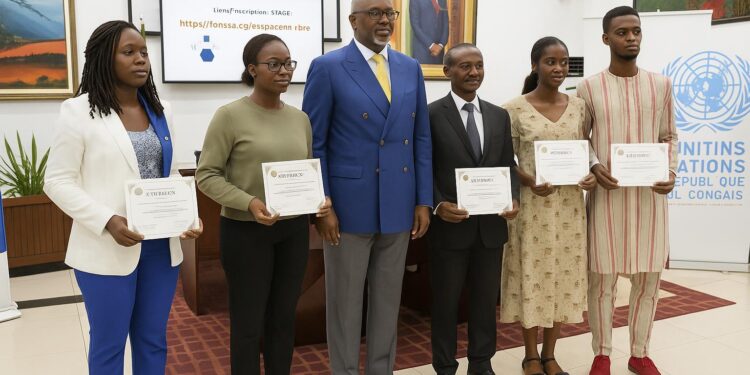Certificate ceremony spotlights youth skills
Under the marble columns of Brazzaville’s Palais des Congrès, officials applauded the handover of completion certificates to the first graduates of Stagi, a flagship internship scheme championed by President Denis Sassou Nguesso to equip Congolese youth with skills demanded by a diversifying economy.
The ceremony, held on 22 August and attended by ministers, United Nations representatives and executives of energy major ENI, also launched the steering committee of YouthConnekt Congo and formalised a new internship pledge, weaving together governmental, private and multilateral threads of Congo’s employment strategy.
Stagi cohort metrics and outcomes
According to the National Fund for Employability and Apprenticeship, Fonea, the debut cohort placed 115 young Congolese in corporate internships, while 500 completed the ‘I Create My Business’ entrepreneurship module, 467 benefited from structured mentoring and 615 received tailored coaching, generating a multilayered pipeline of talent.
Officials selected five exemplary participants to receive their attestations onstage, a symbolic sample designed to keep the spotlight tight and personal. Minister for Youth and Vocational Training Hugues Ngouélondélé praised their diligence and framed the numbers as evidence that targeted programming can accelerate national human-capital goals.
Private sector commitment led by ENI
The event’s second highlight was the signature of a letter of engagement between Fonea director-general Robert Patrick Ntsibat and ENI Congo’s managing director Andrea Barberi, through which the Italian energy company committed to host thirty interns from the current intake, reinforcing an already active corporate social-responsibility portfolio.
Barberi described Stagi as ‘a genuine bridge between youthful aspirations and market needs’. He argued that investing in human capital safeguards Congo’s future competitiveness and noted that ENI’s upstream projects in the Offshore Marine XII block will require precisely the technical profiles Stagi participants are cultivating.
UN agencies reinforce government strategy
Multilateral actors echoed the private sector’s optimism. UNDP resident representative Adama Dian Barry credited the government for offering an enabling climate that allows agencies to ‘consolidate investments already yielding tangible dividends’. Similar praise came from UN system coordinator Abdourahamane Diallo, who emphasised Congo’s alignment with Agenda 2030 employment targets.
Analysts in Brazzaville note that such recognition carries diplomatic weight at a time when several Central African states seek to showcase stability and reform capacity to international partners. The endorsement underscores President Sassou Nguesso’s message that youth inclusion forms an indispensable pillar of post-pandemic recovery.
YouthConnekt Congo broadens horizons
While Stagi focuses on internships, the parallel YouthConnekt Congo initiative, launched in partnership with Rwanda’s celebrated YouthConnekt model, widens the aperture to entrepreneurship financing, civic engagement and digital innovation. The newly installed steering committee is charged with harmonising donor inputs and tracking impact metrics across ministries.
YouthConnekt’s regional secretariat in Kigali has confirmed that Congo’s chapter will benefit from an exchange roster enabling start-ups to pitch in regional capitals, a step likely to internationalise local ideas. Observers suggest this could dovetail with the African Continental Free Trade Area’s pending digital trade protocols.
Digital rollout of second cohort
To maintain momentum, the ministry opened online registration for Stagi’s second cohort during the same ceremony. Applicants can upload credentials through Fonea’s portal, a shift intended to remove geographic barriers in a nation where nearly forty percent of citizens now enjoy mobile internet coverage.
Minister Ngouélondélé told reporters that digital enrolment also facilitates real-time analytics on applicant profiles, allowing policymakers to match training modules with labour-market gaps. He cited construction, agriculture and renewable energy as sectors showing the strongest pull factors, referencing data from the National Employment Observatory.
Security and fiscal implications
Diplomatic missions based in Brazzaville view these programs as a stabilising instrument in the wider Gulf of Guinea context, where youth unemployment has intersected with irregular migration and maritime insecurity. European Union officials privately describe Stagi as a ‘preventive peace dividend’, according to a senior envoy.
Financially, the government shoulders stipends while host companies cover supervision costs. The model mirrors arrangements recommended by the International Labour Organization, which suggests splitting obligations to encourage private participation without inflating expenditure, a balance appreciated by fiscal analysts in the Ministry of Finance.
Transparency and future measurement
Observers will watch the second cohort’s conversion rate: how many interns secure full-time roles or launch businesses within twelve months. Fonea pledges to publish quarterly dashboards, a transparency move welcomed by civil-society groups that see data disclosure as key to sustaining credibility.
Now, the spotlight rests on 115 young professionals shaking hands with ministers. Their journeys will test whether Congo’s blend of state leadership, private enterprise and multilateral partnership can translate policy ambitions into livelihoods, reinforcing the narrative of a nation investing in its future.
Green transition and new financing
ENI’s internship scheme targets engineering and geoscience, yet officials hint that future rounds will prioritize renewables, aligning with Congo’s plan to monetize hydro resources while honouring Paris climate pledges.
Talks with the African Development Bank may establish microcredit for alumni proposing climate-smart agribusinesses, an idea slated for discussion at November’s Intra-African Trade Fair in Cairo.












































